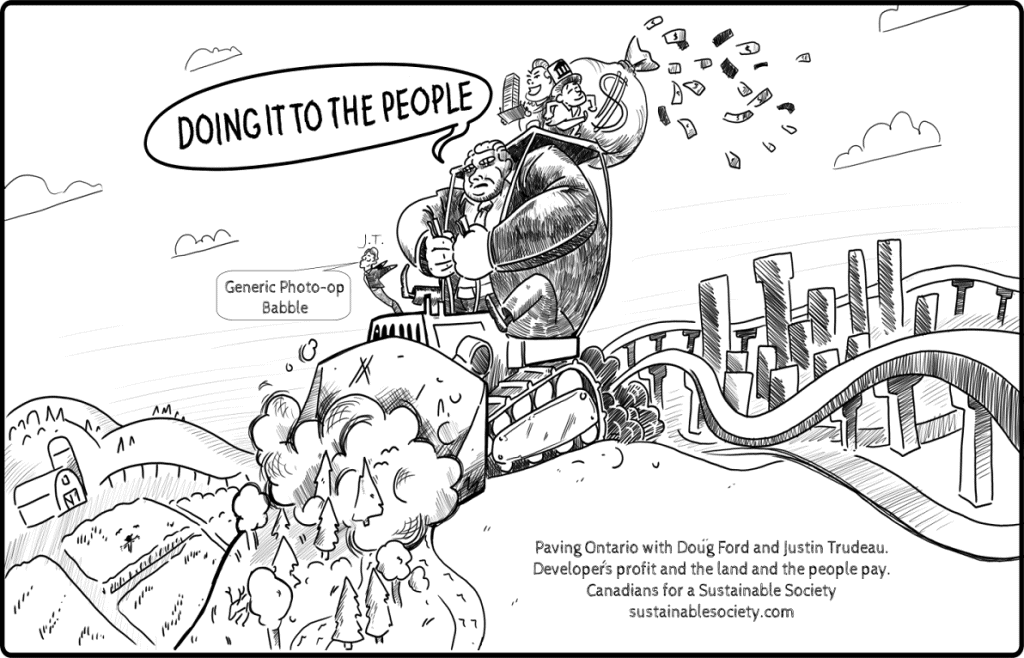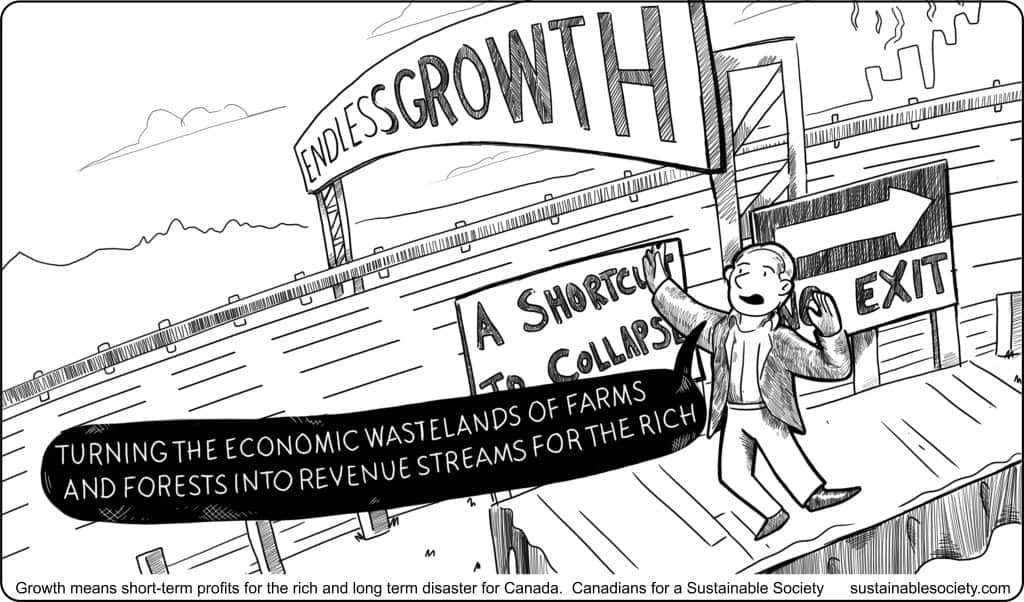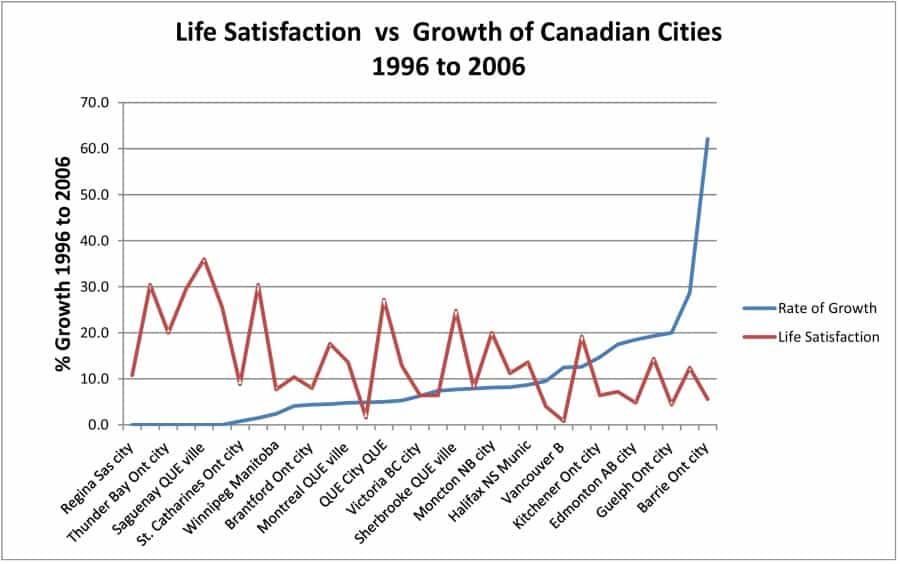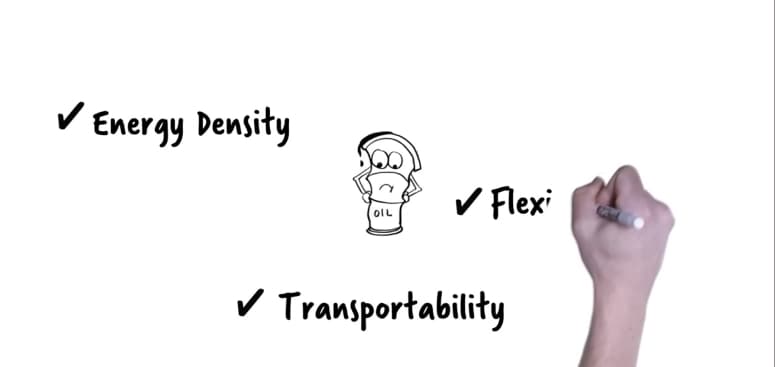Urban sprawl is possibly the most high-profile impact of growing and shifting populations. It has large and immediate consequences for people and communities by increasing congestion, making housing unaffordable, increasing debt, and degrading the environment of the surrounding area. Urban sprawl typically increases taxes and the cost of living while decreasing the quality of life, equality levels and the health of communities.
Urban sprawl is simple growth and, in terms of public welfare, regressive.
Of course, urban expansion in Canada and most countries takes place on farmland, thus removing a critical resource from use while increasing the number of people that must be fed. As well densification also has the large downsides of less healthy living and increased congestion.



Here is what the addition of 5 million people has done to the Ontario landscape over a period of 35 years. The government’s plan is to continuously ramp up population growth to triple Canada’s population in the next 100 years. This will mean the addition of another 30 million people in Ontario – 6 times the growth of the past 35 years.
Once a breadbasket for the world, Ontario is now on the cusp of becoming a net food importer. The reduction in farmland and increase in population makes our impending loss of food security a certainty within the next 5 years.
Sprawl Video: https://www.youtube.com/watch?v=36iPVbnK0b8&t=45s

In the “developed” world, with slow-growing, stable or even slightly declining native populations, sprawl is mostly driven by immigration. In Africa and South America, sprawl is driven by still growing domestic populations and migration from rural to urban areas. In China, the construction of immense blocks of large apartment buildings is being driven by the flow of people from the countryside into the cities. This is a shift from rural to urban centres as the population of China is at or near its peak.
Because of the obvious damage sprawl is doing to the land and the lives of citizens, a great many protest groups have sprung up to oppose it. These may be focused on wetlands, farmland, gravel pits, access to nature, affordable housing and taxes but they all have one thing in common; sprawl is hurting their vital interests. They want governments to get back into the business of responsible governance rather than just taking orders from developers, speculators and debt mongers.
Below is a list of groups opposed to sprawl. This is an initial list only and very much a work in progress. Please supply the names and contact info for any groups you know of, anywhere in the world and we will post it as quickly as possible. You can reach us at info@sustainablesociety.com. There is a list of useful resources – cartoons, placard and bumper sticker slogans and research papers in the Reference section of this page.
Most established politicians have gone through the media filter and are pro-growth and have not given any consideration to how social progress and environmental sustainability can be achieved. They have no strategy for progress and their only policy is “bigger is better”. While in the past most politicians have conflated growth with progress, this may be changing. To help this transition along the best thing a voter can do is find a candidate who is proactive and anti-sprawl and fully support them! And let the other candidates know why.
How do you do this? By asking questions such as:
- Are you in favour of building on farmland and forests? If not, where do you see growth stopping if ever?
- What do you think is in the best interests of your constituents, a bigger town or a better town?
- Do you have a strategy in place to achieve energy sustainability? Food security?
- How does a growing population impact Canada’s carbon emissions? (hint: The carbon footprint of the current immigrant stream increases by a factor of 4:1 when they come to Canada. For some regions it can be 15:1. This is also a disaster for the globe. The Challenge – please tell us if, globally, you can think of a more environmentally destructive policy than mass migration from regions of low carbon emissions to regions of high carbon emissions.)
Groups Opposing Sprawl and Its Impacts
Canada - Ontario
Ontario is losing farmland faster than any other province; at a rate of about 175 acres per day.
The provincial government of Ontario and the federal Canadian government have embarked on a policy of mass immigration to drive the profitability of developers, speculators and banks (mortgages) to new heights despite the consequences for citizens and the environment. Follow the money. For reference, “balanced immigration”, meaning as many people coming into Canada as going out, would be approximately 60,000 people annually. The current level, deemed “mass immigration”, is approximately 440,000 and increasing every year, resulting in the 160,000 new additional housing units being built and 250,000 additional vehicles being put on the roads every year.
Obviously, many municipal governments are opposed to this, but the Ontario government is forcing this growth on them by overriding the planning and zoning process. Democracy? Maybe Putin-style democracy but not what we expect in a nominally democratic country.
The groups listed below may or may not support a stable population policy but they all recognize the environmental and social costs of urban sprawl.
Stop Sprawl Orillia – https://stopsprawlorillia.ca/
Simcoe County Greenbelt Coalition – https://simcoecountygreenbelt.ca
Rescue Lake Simcoe Coalition – https://rescuelakesimcoe.org
Greenbelt Foundation – http://www.greenbelt.ca/
Ontario Nature – https://ontarionature.org/
Environmental Defence – https://environmentaldefence.ca/
Stop Sprawl Halton – https://www.stopsprawlhalton.org
Stop Sprawl Durham – https://www.stopsprawldurham.com/
Stop Sprawl York Region – https://www.StopSprawlYR.ca
“What’s Wrong with Sprawl – The Province of Ontario has ordered municipalities to plan for growth to 2051 that will result in huge population increases in the Lake Simcoe area and related environmental impacts, most notably loss of farmland and increased salt, stormwater runoff, and potentially sewage from new development.”
Please email us with any the names of any stop sprawl groups not on the above list at: info@sustainablesociety.com
Canada – Alberta
Stop the Sprawl Calgary – a huge amount of resources – https://www.sprawlcalgary.com/
Lethbridge Sustainable Living Association – https://www.lethbridgesustainableliving.org
Canada - BC
BC Municipalities Get Ornery. Not paving over farmland fast enough? The province will take you down but some municipalities are standing up. Oak Bay’s rejection of housing project cited as province eyes taking over approval powers. Will non-compliant municipal politicians be given 15 years in jail for uttering the word “sprawl”?? Will journalists be blacklisted?
Europe - UK
Open Spaces Society – Protecting Open Spaces Since 1865 – https://www.oss.org.uk
Revaluing Parks and Green Spaces | Fields in Trust is an independent charity with over 90 years’ experience protecting parks and green spaces – https://www.fieldsintrust.org
Global Action Plan: an environmental change charity working towards a green and thriving planet where everyone can enjoy happy and healthy lives within the Earth’s limits – https://www.globalactionplan.org.uk
Groundwork: Find out how we’re changing places and lives in your area. … ensure that everyone across the UK can enjoy the benefits of accessing green and blue spaces – https://www.groundwork.org.uk
Green Flag Forward – Environment charity reveals “green space gap” – https://greenflagaward.org
Europe - Scotland
Greenspace Scotland – https://www.greenspacescotland.org.uk
USA - Arizona
Is it Possible to Combat Sprawl in the Desert? Phoenix is a city with a sprawl problem. How do we fix it? Create smart growth boundaries and incentivize urban, walkable, and tree-shaded streets – https://thiscouldbephx.com
http://www.azuswebworks.com/urbansprawl
AZ Sprawl – Stopping Sprawl in Your Community “Driven to Action encourages communities to reshape urban areas. We need more dense and compact cities, with better bike and walking infrastructure – http://www.arizonasprawl.com
USA
Center for the Advancement of the Steady State Economy – www.steadystate.org
Join thousands of top scientists, economists, diplomats and thought leaders from “left” and “right” around the world. You’ll help bring steady-state economics into national policies and international diplomacy.”

What has growth done for us lately? If you are among the vast majority of people in developed countries your quality of life and employment have gone down in the past 5 decades while debt and inequality levels have increased dramatically.
Below are the misconceptions that have driven the failure of public policy and the disintegration of the national conversation.
The Free Money Con
- Generational transfer link – the money may seem like a free windfall to you but your children pick up the tab plus hefty interest rate and income tax overhead charges. Only the parasitic overhead of speculators and banks benefit.
- Housing is a consumer good not a real wealth creating investment. Housing inflation involves no value added.
The Growth-Forever Con
- Both the world and Canada have overshot their environmental base and consumption must be dramatically reduced to avoid disastrous climate change and ecological collapse. Growth is something to be eschewed rather than pursued if human societies are to remain healthy and able to continuously progress.
Growth – What it done for us lately?
- Once we look past the sizzle of inflated housing prices and higher GDP numbers, what kind of steak has our growth-obsessed government actually served up on our plate?
- The graph below shows the Life Satisfaction index of residents of cities and towns by rate of growth over 10 years. It demonstrates that the higher the rate of growth, the lower the life satisfaction of residents. No surprise there as Canadians flee large urban centres, so why do politicians feel compelled to chase growth? Follow the money.

Job Quality – has declined with more people taking multiple part-time jobs and split shifts with low pay. Former finance minister Bill Morneau in 2016 told young people to get used to a “job churn.” Why is no one challenging the government for creating this job churn through its policy of mass immigration?
https://www.theglobeandmail.com/report-on-business/economy/jobs/canadian-youth-working-low-paid-temporary-jobs/article32579528/
Housing Affordability – has gotten far worse as even couples with two good jobs are unable to afford their home in many areas of the country. In contrast, five decades ago, a single income could support a family in its own house. It is now rare for children to be able to afford to live near their parents.
https://sustainablesociety.com/social/affordable-housing#.YnWv6lTMK70
Debt – personal debt levels have quintupled over the past four decades.
Equality – unaffordable housing and declining job quality are the perfect engine of inequality for developed countries, and in Canada the equality level has fallen from second best in the world in the early 1960s to the mid-30s in 2020. This is an astonishing drop which our growth-centric media corporations completely ignore. After all, the economy is growing, who cares how the people are doing! Media corporations scream blue murder if wages go up but they trumpet rising housing costs as an economic miracle – “the Wealth Effect” or Asset Enhancement”.
Congestion – more people packed into the same areas means higher congestion and the increasing commute times tell the tale. This is another reason for the flight of Canadians out of our major cities.
Access to Nature – The bigger cites get and the harder they are to get out of, the more difficult it is for people to connect with nature.
Quality of Life – all of these factors combine to produce a lifestyle which is more stressed, less healthy and less satisfying than it was before growth became the sole mandate of the major political parties.
What needs to be done?
In the next decade we need to rapidly reverse the pressure we’ve put on earth’s natural systems and we need to re-focus public policy on human well-being. Below are some of the considerations which need to be built into proactive initiatives. We also need to prioritize human and environmental welfare far ahead of the size or growth rate of the commercial economy. GDP is a measurement tool of commercial activity, and it should never have been allowed to become a goal in itself.
First, we need to stop doing damage. Stop paving over farmland and displacing forest and species. Second, we need to figure out what it will take for us to become sustainable.
Renewable energy infrastructure
Planning for the future must include the investment necessary to become sustainable in energy and food. If not completely self-sufficient, at least highly resilient.
Below is a table of the number of hectares of solar farms, wind turbines, foodland and small modular nuclear reactors (SMR) require to completely feed and energize 10,000 people. See the Orillia Report in the reference section for greater detail.
Solar Farm (hectares) |
Wind Turbines (2 Mega Watt) |
Food Land (hectares) |
Small Modular Reactors (300 Mega Watt) |
|
|---|---|---|---|---|
|
Infrastructure Needed per 10,000 people |
80 |
112 |
4,000 |
0.23 |
The above figures for energy assume that 100% of energy will be supplied by solar or wind or nuclear. Certainly there will be a mix so the infrastructure for any of the above will be less.
Farm acreage is based on current Ontario productivity levels. Energy requirements are based on a completely electrified economy with a daily energy budget of 150kWh per person. Electrification in addition to intensive conservation and lifestyle measures should allow us to maintain a 150kWh/day budget. The current level of Canadian per capita energy consumption is over 300 kWh per day but this includes the production and export of large amounts of fossil fuels and it recognizes the fact that 80% of our current energy consumption is fossil fuel based. The switch to electricity will mean efficiency levels will almost triple. Also, included in the 150kWh budget figure is the assumption that manufacturing is repatriated so our entire economy is largely self-sufficient and highly resilient.
Tripling Canada’s population as 1% immigration will do within 100 years may make speculators rich but it will make achieving sustainability impossible. The transition to renewable energy will be an extreme challenge for our current population and will be impossible for a growing population.
Our difficulties will be exacerbated the longer we take to make determined efforts. Failure to be proactive and get ahead of the problem will force us to make much greater sacrifices later with much poorer outcomes. We must reduce consumption and transform our energy systems all the while maintaining social cohesion.
Fiscal Balance
The rapid population growth business model has generated an increasingly high percentage of low wage jobs. The tax breakeven point for jobs is probably in the $45,000 range and any job created paying less is tax negative. Increasing the portion of low paying jobs creates a structural deficit where there is less revenue coming in and more expenditure going out, as low paying jobs are less stable and require higher levels of social support. In effect, low wage employers are being subsidized by taxpayers.
If we invest in our people with training and productivity-increasing tools and equipment, we can progress. If we continue to treat our citizens like consumers and suppliers of cheap labour, deficits will be on-going and worsening. The real economy thrives on productivity while the fake money economy thrives on inflated asset valuations and market growth.
Public Opinion
Government, and in particular media corporations, can start to recover their relevance by actually listening to the people whom they are supposed to be serving. One municipal government actually did do this and when the city of Orillia asked its residents for their opinions on what government priorities should be, this is the response they received. It was public opinion, unfiltered by commercial media.
How would Orillians spend their own money on improving life in Orillia? What are their priorities?
Ranking |
Average |
|---|---|
|
Quality of Life |
26.5 |
|
Healthy Environment |
24.3 |
|
Sustainable Growth |
19.4 |
|
Professional, Progressive City |
16.2 |
|
Vibrant Waterfront |
15.5 |
|
Heritage Core |
14.7 |
Total of Quality of life and healthy living related categories = 82.5 (26.5 + 24.3 + 16.2 + 15.5 = 82.5)
Total involving any kind of simple growth = 19.4 but even sustainable growth implies quality, not quantity. Vibrant Waterfront (15.5) does imply more infrastructure. Note that “Sustainable Growth” – the growth industry’s weasel word for endless growth – explicitly in the public mind means no to unsustainable growth.
The item of “Professional, Progressive City” speaks to quality, not size. Nowhere do citizens express any desire for a bigger city, more congestion, higher housing costs or higher taxes which are the givens of population growth.
Democracy Denied and Environmental Impact Assessment process evaded
In Ontario and BC, local governments are being forced to accept growth, growth that has had no environmental review for obvious reasons. The practice of forcing growth upon communities takes decision-making out of the publics hands. It also removes growth from any examination of its social and environmental impacts.
“Growth is Good” is a claim that has rung hollow for over 6 decades now and we need to switch our priorities to rebuilding progress
Follow the Money
Population growth and housing inflation are the blood of life for large developers, speculators and lending institutions. Developers are the prime source of election campaign donations for a very high percentage of our elected officials and nothing could be a more clear conflict of interest. The “Campaign Finance and Campaign Success in Municipal Elections in the Toronto Region” study by Robert MacDermid of York University in 2007 documented this flow of funds in great detail.
Media corporations get a very significant portion of their ad revenue from developers (new home ads) and debt institutions. Media corporation revenue is dependent on the size of their local market and its rate of growth. Strangely enough, these same media corporations never challenge growth nor do they follow up on studies like the MacDermid Report. If it isn’t profitable, it isn’t news.
- Conquest of the Land Through 7,000 Years
- South China Morning Post: Ian Young – The connection between high immigration levels and unaffordable housing for those actually requiring scientific proof.
- Viable Farmland: Ontario’s Past, Present and Future
- The Bill Laurance and Jayden Engert article provides an easily readable summary of the Simkin et al. paper, with discussion of its important findings and implications. Laurance, W. F., and J. Engert. 2022. Sprawling cities are rapidly encroaching on Earth’s biodiversity. Proceedings of the National Academy of Sciences USA 119: e2202244119.
- YouTube: Growth Busters – Video on urban sprawl – funny with great expert commentary “Growth Busters!”
- Sustainable Society Comic – Doug Ford Paving Ontario Cartoon
- Simkin et al., provides startling evidence that burgeoning cities are increasingly posing a serious and growing threat to global biodiversity. This data-rich study has vital implications for nature conservation. Simkin, R. D., et al. 2022. Biodiversity impacts and conservation implications of urban land expansion projected to 2050. Proceedings of the National Academy of Sciences USA 119: e2117297119
- YouTube: 1st Class Titanic Passenger Doesn’t see what all the fuss is about – And, of course, a capsule summary of the difficulty of executing fundamental change in a highly stratified society. Full tongue in cheek.
- POPULATION GROWTH and the DIMINISHING NATURAL STATE of ARIZONA. Analysis of National Resources Inventory & U.S. Census Data on. Development and Habitat Loss
- Ontario Farmland Requirements
- Campaign Finance and Campaign Success in Municipal Elections in the Toronto, Region.1 , Robert MacDermid, York University (follow the money)
- Sustainable Society Article – The Growth Myth – Perpetual Motion Machine
- Sustainable Society Comics – Endless Growth Cartoon
- Orillia Report – The public interest and will vs the growth mandate of the Ford and Trudeau governments. What does sustainability look like and how should we prepare.


